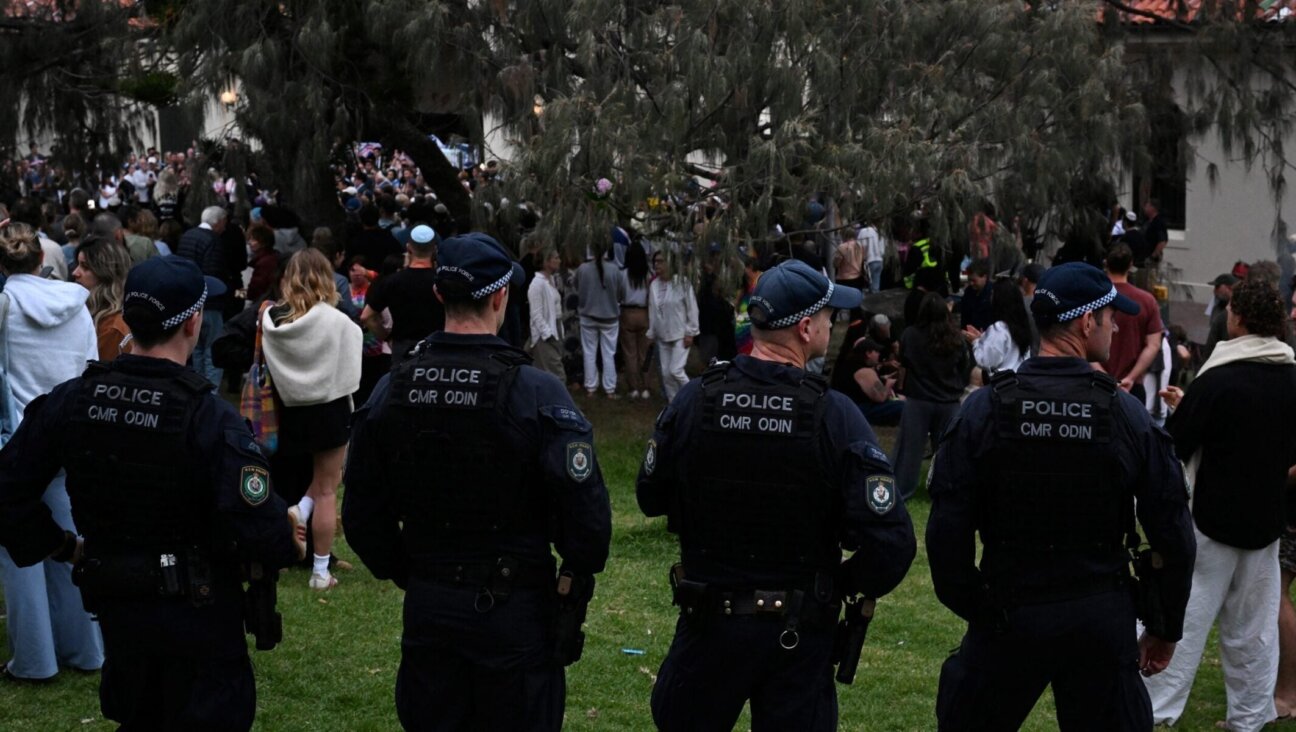Jewish Groups Turn a Cold Shoulder To Turkey, as Turks Refuse To Budge

?Displeasure?: Ibrahim Kalin, chief adviser to the Turkish prime minister, said Turkish diplomats heard words of ?displeasure? and ?disappointment? expressed in meetings in Washington. Image by COURTESY OF THE MIDDLE EAST INSTITUTE
“The relations are going off the cliff,” one Jewish leader warned. “It’s getting worse by the day,” another added. A member of Congress spoke of a “chasm” between Israel and Turkey, and a Turkish government official was the most colorful of all. “Relations between Israel and Turkey,” he said, “resemble two Formula 1 race cars facing each other and going to crash.”
But as fallout from the Gaza flotilla incident threatens to cloud future relations between Israel and Turkey, the gravity of the situation seems to be the only issue that Turks and American Jews agree on. Turkish attempts to meet and talk with leaders of the Jewish community were turned down flat, and both sides seem entrenched in their respective positions: The Turks insist on an Israeli apology and an international inquiry into the episode, in which Israeli commandoes killed nine Turkish nationals in international waters, and supporters of Israel argue that the government of Prime Minister Recep Tayyip Erdogan has resolved to break Turkey’s historic bond with the Jewish state.
Understanding the Jewish community’s shift in attitude toward Turkey requires a look beyond the diplomatic discourse. Jewish groups, who until recent months defended the Israeli-Turkish alliance, are now taking on the task of portraying the Erdogan government as supporting terrorist and extremist regimes.
An e-mail blast sent out by The Israel Project, a pro-Israel advocacy group whose target audience is journalists covering the Middle East, highlighted Turkey’s military actions against the Kurdish minority in Northern Iraq, pointed to a report about the beheading of a Turkish Catholic leader and, under a photo of Erdogan shaking hands with Iran’s president, Mahmoud Ahmadinejad, listed events marking “Turkey’s changing posture towards Israel and the West.”
The American Israel Public Affairs Committee distributed an e-mail promoting a video depicting Erdogan alongside Ahmadinejad and Syria’s Bashar Al-Assad as “The Three Terrors,” a takeoff on the famous Three Tenors — Domingo, Pavarotti and Carreras.
But speaking stronger than parodies and damning reports was the cold shoulder that Jewish groups turned to Turkish officials who were trying to reach out. Representatives of most major Jewish organizations were invited to a June 16 meeting with members of a senior Turkish delegation visiting Washington. Only one group, the American Jewish Committee, showed up. AIPAC, the Anti-Defamation League and the Jewish Institute for National Security Affairs — all groups that in the past went to great lengths to push a pro-Turkish agenda on Capitol Hill — chose not to attend.
“We felt that attending the meeting at this particular time would have been counterproductive,” said Dan Mariaschin, executive vice president of B’nai B’rith International. “The inflammatory rhetoric of the Turkish government created an atmosphere in which rational discussion of the issues would not have taken place.”
Still, some in the community warn of taking the anti-Turkish rhetoric too far. “As emotionally satisfying as it would be to burn our Turkish-Jewish club membership cards, it is better to take a deep breath and hope there is a solution,” said William Daroff, vice president for public policy of The Jewish Federations of North America.
The Turkish delegation took note of the Jewish snub and made clear that it was unhappy with the approach of the organized community.
“Those who did not come had made a mistake in terms of their approach to the Turkish-Jewish relationship,” said Omer Celik, vice chairman of Turkey’s ruling Justice and Development Party (AKP). Celik was part of an AKP delegation making the rounds in Washington, in an attempt to mend fences with the Obama administration and with Congress and the Jewish community.
The delegation did not deny its government’s deep differences with Israel on crucial issues, but it vigorously contested pro-Israel Jewish groups and lawmakers now painting Turkey as a terrorist-supporting state working to undermine Israel’s very existence. It was Erdogan, now depicted as an inveterately hostile Islamist, who brought then-prime minister Ehud Olmert to Ankara to give an official address to Turkey’s parliament just three years ago, the delegation noted — the first Turkish leader to invite an Israeli leader to do so.
And just two weeks before the Gaza flotilla episode, the Turks stressed, Turkey voted with other member countries of the Organisation for Economic Co-operation and Development to admit Israel to the elite group of top-tier economies. Under OECD rules, which require a consensus to admit a new country, a “no” vote from Turkey would have meant defeat for one of Israel’s prime diplomatic goals.
Despite these talking points, it was a tough week for the high-level delegation. “We heard in Washington words like ‘disappointment,’ ‘displeasure,’” recalled Ibrahim Kalin, chief adviser to the Turkish prime minister who attended the meetings. Administration officials admonished Turkey for voting against the resolution imposing sanctions on Iran at the United Nations Security Council, and harsh criticism was also voiced by members of Congress and by the few Jewish officials who were willing to meet the group.
Among those Jewish officials was Jason Isaacson, director of government and international affairs at the AJC. Isaacson broke ranks with the Jewish organizational establishment and reached out to Turkey’s ambassador to Washington days after the flotilla incident, an act that won him criticism from Israeli officials who argued that it was the Turks who should have made the first step. AJC was also the only group to attend the meeting with the AKP delegation. Isaacson explained that boycotts could be misunderstood, and therefore it is “important to get our message across without diplomatic filters and niceties. We want Ankara to hear the message in every possible channel.”
But most channels are currently blocked. The Israeli Embassy, according to a senior official, is in “complete disconnect” with Turkey’s diplomatic mission. And in Congress, criticism reached its peak with a series of anti-Turkish remarks by leading Jewish lawmakers.
New York Democrat Anthony Weiner took aim at Turkey’s membership in the North Atlantic Treaty Organization, stating that this membership should be “called into question.” Another Jewish Democrat, Shelley Berkley of Nevada, added that the European Union, of which Turkey has long aspired to become part, should stop talks on this issue, because the Turks “don’t deserve to be part of the EU.”
Gary Ackerman, who heads the House subcommittee on the Middle East and South Asia, wrote a letter to the Woodrow Wilson International Center for Scholars, protesting its decision to honor Turkish foreign minister Ahmet Davutoglu. Turkey’s foreign policy under Davutoglu, Ackerman argued, is “rife with illegality, irresponsibility and hypocrisy.” Ackerman cited Ankara’s refusal to recognize the Armenian genocide, Turkey’s occupation of Northern Cyprus, and the Erdogan government’s ties with Iran and Sudan, among other issues.
But in a June 21 interview with the Forward, Ackerman said that it is time to move on. According to the New York Democrat, it would be in the best interest of the United States and of Israel to find a way of restoring relations with Ankara. “They’ve earned the comments they received, but that doesn’t mean you can’t go back to the right direction,” Ackerman said.
Congress holds the capacity to inflict significant diplomatic hardship on Turkey.
A congressional resolution recognizing the Armenian genocide is waiting for a vote in Congress and could move forward if House Speaker Nancy Pelosi decides to allow such a step; pressure could also come from Congress on Cyprus, Kurdistan and the Armenian border. On a more practical level, Congress could also put the brakes on a large unmanned drone deal that was finalized between Washington and Ankara before the crisis broke.
For former congressman Robert Wexler, a Jewish Democrat who retired last year, calls to take such steps seem misguided. Wexler, who headed the House Turkish caucus, said that there were “too many inflammatory remarks and actions” in recent weeks. “It is now time to be sober,” he added. “Some of the calls coming from Congress are particularly unhelpful.”
Members of the Turkish delegation, speaking with the Forward on the sidelines of a June 18 conference sponsored by the Middle East Institute’s new Center for Turkish Studies, expressed their frustration over what they described as a refusal of U.S. officials to see Turkey’s viewpoint.
“We’re having a hard time to understand it,” said Namik Tan, Turkey’s ambassador to Washington who previously served as his country’s envoy to Israel. Tan called the reaction of the Jewish community “emotional” and said Jewish leaders have tried to “shift the blame” for the flotilla events to Turkey. “Israel is on the verge of losing one of its closest friends,” he warned.
Celik added that a recurring message he had heard in meetings in Washington was the price that Turkey would pay if it lost Israel as an ally. “We asked what will happen to Israel if it loses Turkey,” Celik said. Mentioning issues related to Armenia or the Kurdish militant group PKK “sounds like a threat” to the Turks, he said, adding, “Friends do not threaten each other.”
Much of the Turkish frustration was directed at the Obama administration. Members of the Turkish delegation said they were scolded for opposing the American-backed Security Council Resolution that passed on June 8 to impose new sanctions on Iran. But a few days later, they said, American diplomats asked them to keep an open channel for talks with Iran. “How are we supposed to talk to Iranians if we voted yes [in the Security Council]?” asked Kalin. “How is that possible?”
Contact Nathan Guttman at [email protected]

















